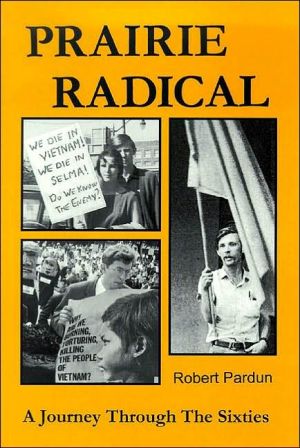

 |

|

The average rating for Prairie radical based on 2 reviews is 3.5 stars.
Review # 1 was written on 2012-05-14 00:00:00 Yong Chuan Tan Yong Chuan TanThis book is the second of three volumes that comprise America in the King Years, a history of the civil rights movement. Taylor Branch won the 1989 Pulitzer Prize for his work on this project. This book covers the history of the civil rights movement between the years of 1964 to 1965. I listened to an audio version which was abridged. I usually shun abridged versions, but I don't have time to make it through the unabridged 2,500 pages of the three volumes. Lyndon Johnson successfully encouraged passage of the Civil Right Act which was passed in 1964. It banned discrimination based on "race, color, religion, sex or national origin" in employment practices and public accommodations. But that didn't mean compliance was immediate. Voting rights continued to be a problem. Much of the civil rights action during 1964 and 65 was focused on getting African Americans registered to vote. But state and local governments in the "old south" utilized all sorts of creative (and terroristic) ways to slow down and stall registration efforts. Probably the most infamous incident was the murder of three civil rights workers in Mississippi by the Ku Klux Klan. One fascinating detail learned from the confessions of the murders is that one of victims seconds before being shot said, "I know exactly how you feel." It was said in answer to the question shouted by the gunman into his face, "Are you the n--- lover?" I won't take time to list here all the lives lost in acts of violence in this era. Probably the most disheartening part about this history is how difficult it was to get a jury to convict any Ku Klux Klan member. Martn Luther King was awarded the Nobel Peace Prize late in 1964. J. Edgar Hoover was clearly not sympathetic to the civil rights movement, and he particularly did not like King. I learned from this book that the tapes sent (it had to have been sent by FBI at Hoover's instructions) to MLK's house for the purpose of persuading him to commit suicide prior to acceptance of the Nobel Price were not noticed until after he had already accepted the prize. Hoover had a face-to-face meeting with MLK prior to the package with the tapes being opened, and Hoover probably marveled at how cool MLK acted (because Hoover would have thought that MLK knew about the tapes). I didn't have a good opinion about J. Edgar Hoover prior to this book, and now I have an even lower opinion. The internal battles of the African-American Muslim leaders (Malcolm X vs. Elijah Muhammad) are described in this book. Malcolm X was assassinated early in 1965. March 7, 1965 became known as Bloody Sunday. Civil rights workers in Selma, Alabama, began the Selma to Montgomery march but are forcibly stopped by a massive Alabama State trooper and police blockade as they cross the Edmund Pettus Bridge. Many marchers were injured. This march, initiated and organized by James Bevel, becomes the visual symbol of the Selma Voting Rights Movement. The Voting Right Act was signed by President Johnson on August 6, 1965. It eliminated literacy tests, poll tax, and other subjective voter tests that were widely responsible for the disfranchisement of African-Americans in the southern states and provided Federal oversight of voter registration in states and individual voting districts where such discriminatory tests were used. Again compliance with the law was slow, but it made a difference in the long run. |
Review # 2 was written on 2008-11-29 00:00:00 Denise Guthrie Denise GuthrieVolumes I and III were two of the best books I have ever read. But this one was annoying, because Branch spent hundreds of pages reviewing the background facts of the first volume I guess to get the reader up to speed in case they had not read the first volume. Who does that? What sane person is going to start a trilogy at volume II? Besides, the review was in such a shotgun fashion that I'm not even sure it would have been real useful or informative for a new reader. Anyway, once he got through the review, the book picked up and was really just as good as the other two volumes. But four stars, because the lengthy review was that painful. Mercifully, he did not repeat the review mistake in Volume III. And so, it bears repeating, volumes I and III were two of the best books I have ever read. What an incredible trilogy. |
CAN'T FIND WHAT YOU'RE LOOKING FOR? CLICK HERE!!!